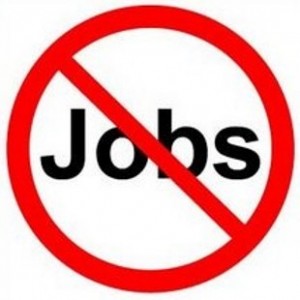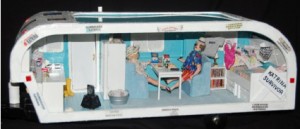There is never a good time to lose 5,000 jobs, but for Louisiana, the news that Northrop Grumman Corp. will close its Avondale shipyard (near New Orleans) could not have come at a worse time. Industries critical to the state’s economy – oil and gas, tourism, fishing – are devastated by the oil spill. Now with the closure of shipyards, the manufacturing industry comes under pressure as well. The 5,000 jobs to be eliminated include engineers, welders, pipefitters and other manufacturing positions that paid annual salaries of $62,000, on average. New Orleans is also facing hundreds of job eliminations at the Michoud Assembly Center, which employs workers from Lockheed Martin. The closures are the consequence of economic pressure for cost efficiency, unrelated to the oil spill. But the consequences are far-reaching as entire service industries support these facilities. In Lower Manhattan, we are all too familiar with this phenomenon: the financial crisis in the fall of 2008 resulted in substantial reductions in the New York banking workforce which, in turn, crippled small businesses that served those workers. You need only see the restaurant closings in the neighborhood to appreciate the ripple effect of the pain. And as we also know from our experience in New York, when a Fortune 500 company leaves, it typically transfers its financial support to other local charities in the communities where it maintains a presence. Reductions in the presence of Fortune 500 companies in New York impacted local charities that depended on those companies for grant support. What I find so upsetting about the experiences of communities facing disasters is that there appears to be no national learning taking place. We suffer needless pain, over and over again, as we experience the same losses from one community to the other. For a country with the diversity and richness of experience as ours, this is unacceptable.
Archive for July, 2010
Another Blow to Louisiana
Monday, July 19th, 2010When Cash Isn’t King
Sunday, July 18th, 2010Businesses in the Gulf Coast states that cannot document their earned income are at a disadvantage in filing claims for losses arising from the oil spill. But for all business owners, there are other costs of running a cash business that may not be obvious until it comes time to think about the exit strategy. The value of a business is typically derived as a multiple of earnings, so any cash or phantom income reduces the perceived value of the business to the buyer. Indeed, the lack of good financial records is consistently identified as one of the top three reasons why businesses are not saleable or sell for far less than the owners believe the businesses to be worth.
I recently heard Andrew Bryan Burnett, managing director of the Cathedral Consulting Group, deliver a presentation “Running Your Business With the Exit Strategy in Mind”. He holds an MBA from Wharton and hosts his own radio show, “My Father’s Business”. Based on his experience in advising business owners, he identified six obstacles to maximizing value on the sale of the business:
- Tax structure
- Poor financial statements or lack of records
- Complicated structures involving too many people
- Minority interest without a buy-sell agreement
- Inability to identify potential buyers
- Asset structure that impairs the sale of the business
The value of the business is the future cash flow to the buyer which value must be identifiable and transferable. A major source of contention on disaster relief post-Katrina was the lack of transferable property deeds in New Orleans as some properties passed from one generation to the next in the family without an update of public records. A disaster is the worst time to put your records in order. Do it now – it will reduce your stress levels later.
Band-Aids Don’t Help
Saturday, July 17th, 2010Do a Google search on small business promotion and you will be amazed at the incentives offered by local and state governments. They are partnering with the Kauffman Foundation to offer FastTrac® entrepreneurial training for new ventures and growth ventures. They are sponsoring business plan competitions to offer modest cash awards. They are investing in business incubators to make low-cost start-up space available. Why the sudden enthusiasm for entrepreneurs? Because we have a serious employment crisis in the United States. Our private sector has lost over 10 million jobs since 2007, even before the banking crisis. The average period of unemployment exceeds 35 weeks and many of the unemployed are no longer counted in the ranks, as they drop out of the market altogether when they lose benefits or become completely discouraged. The initiatives offered by state and local governments are too weak to address our root problem: uncertainty around rising taxes (both the magnitude and the timing of anticipated increases), the implementation of healthcare reform and other measures, including lack of access to capital, deter small businesses from hiring. Until the federal government gets serious about consistent, responsible long-term policies for economic growth, band-aids from local governments won’t address the unemployment crisis.
New Ban on Offshore Drilling
Friday, July 16th, 2010The residents of the Gulf Coast states remain in limbo as their economic future will once more be debated in court. After its ban on deepwater offshore drilling was struck down by a Louisiana judge, the White House imposed an even more extensive ban. The original moratorium banned deepwater drilling, defined as drilling in waters of more than 500 feet in depth. The courts struck down the ban on the ground that it was arbitrary and exceeded the scope of executive authority. The new moratoriums imposed by Interior Secretary Salazar, acting on behalf of the Obama administration, applies to any deep-water floating facility with drilling activities, irrespective of depth. The ban imposes considerable hardship on the Gulf Coast states, as the local economy depends upon the oil industry. CNN estimates the oil industry in the Gulf Coast to contribute $150 billion annually to the local economy, well in excess of the tourism industry. And of course, this ban comes at a time when the fishing industry is already suffering the consequences of the oil spill. Public concerns about risk management protocols must be addressed, but an outright ban fails to do that while imposing considerable hardship on communities that are already suffering.
Small Business Lessons from the SEC Settlement
Thursday, July 15th, 2010The Securities and Exchange Commission announced this afternoon that it had reached a settlement agreement with investment bank Goldman Sachs in connection with fraud charges it had filed in April. There is a lesson here for small business owners about electronic file management! Earlier this year, the Congressional Financial Crisis Inquiry Commission subpoenaed Goldman Sachs to produce certain documents to inform the Commission’s investigation into the causes of the 2008 banking sector meltdown. The Commission is to issue a report of its findings in December. Goldman complied with the subpoena and then some, by turning over 2.5 billion documents, which enraged Commissioner, and former California Treasurer, Phil Angelides. “We did not ask them to pull up a dump truck to our offices to dump a bunch of rubbish,” said Angelides. “We should not be forced to play ‘Where’s Waldo?’ on behalf of the American people.” The Hill mocked the Commissioner’s reaction, asking if he really thought that Goldman would just “pick out the documents that make it look like it caused the crisis and perhaps even highlight the really damning stuff in yellow.”
I suspect that the ability to comply so readily and so generously with subpoenas likely tipped the negotiations in Goldman’s favor. Back in 2005, I had occasion to speak at a small business protection event sponsored by Hewlett-Packard and Agilysys in San Diego. John Hinkle and Chris Fulton of Agilysys shared their observations of plaintiffs attempting to motivate quick, default settlements on civil claims against corporate defendants that could not furnish subpoenaed documents in a timely manner. On the other hand, those that had their electronic files in order and could comply immediately found that the suits against them were often dropped. Why? Because the plaintiffs lacked the resources to play “Where’s Waldo?” with vast quantities of the files and documents that they themselves had demanded. So protect your business by making sure your documents are backed up, online and offsite available for quick retrieval. This practice will protect your business against legal threats as well as physical hazards.
Continuing Heat Wave Results in Higher Energy Bills
Wednesday, July 14th, 2010WSI, a Weather Channel company, expects most of the U.S. to be, on average, warmer than it has been over the past 30 years. This forecast for prolonged heat suggests both increased energy usage and an even more active hurricane season. “A new La Nina event continues to rapidly evolve as we head deeper into summer. This will favor more heat across the northern US as the summer progresses,” said WSI Chief Meteorologist Dr. Todd Crawford. “In the Atlantic, record warm ocean temperatures also favor warmer-than-normal temperatures across a majority of the US. On the other hand, near-record soil moisture levels across parts of the central and northern Plains, along with a lack of any significant drought conditions in the US, will temper the overall magnitude of the heat. By early July, we expect heat to spread across most of the western US and to persist across the Southeast, while relatively cooler temperatures persist across the north-central and northeastern US. By August and September, we expect the heat to become more widespread across the northern US. For the July-September period as a whole, we are forecasting 836 population-weighted cooling degree days, 7-8% more than last year and about 10% more than the 1971-2000 mean.” Many of us will be revising our budgets for the second half of the year as air conditioning proves to be a larger line item than expected.
FEMA Trailers – the Sequel
Tuesday, July 13th, 2010For disaster-fatigued residents of the Gulf Coast, it must be a struggle to move forward with their lives as a painful symbol of the past has returned: the FEMA trailers. The Federal Emergency Management Agency had provided close to $3 billion worth of mobile home trailers intended to be used for temporary housing for Louisiana residents displaced by Hurricane Katrina. Many occupants of those trailers had developed respiratory ailments, which was subsequently attributed to high levels of formaldehyde resulting from the cheap wood and poor ventilation in the units. The government decided to ban the use of trailers for long-term housing.
But the trailers are re-appearing in the Gulf Coast to provide temporary housing for workers involved in the clean up of the oil spill. Because of the $130 million annual cost to store and maintain the trailers, the government elected to sell them in public auctions. Members of Congress had expressed concerns that the trailers would be re-purposed for long-term housing, which fears appear to have been realized. Purchasers of the trailers may not be aware of the health risks associated with the formaldehyde in the trailers or of the ban on their use for long-term housing purposes. But really, what other purpose would the trailers serve if not housing, as they were built with lavatories and kitchenettes? We are long past the time to demand a comprehensive overhaul and accountability from the Federal Emergency Management Agency. “FEMA Trailers – the Sequel” is simply inexcusable.
This photograph is of original art made by New Orleans artist Karen Niklaus. I enjoy art that expresses powerful messages about politics and social change and this piece resonated with me.
FT Headline: “Small Businesses Lose Out”
Monday, July 12th, 2010When the lead headline on the front page of the Financial Times announces the crisis in small business capital access, the problem can no longer be ignored. Under the headline “Small business lose out” follows an article summarizing the data presented in the “Terms of Business Lending” survey released this week by the Federal Reserve Bank. The survey collects quarterly data from 348 U.S.-chartered commercial banks and 50 U.S. branches of foreign banks. The survey found that interest rates on small commercial and industrial loans were 3.5% higher than the federal funds rate (the rate at which banks borrow to on-lend to customers), the highest spread since the Fed began the survey nearly 25 years ago. It seems that every policy initiative to motivate large banks to unblock the flow of credit to the small business sector, including the Troubled Asset Relief Program, has failed.
Perhaps this is why the Obama administration’s legislation to create a $30 billion small business lending fund has just cleared the Senate with negligible opposition. To accelerate the bill’s passage, Senate Majority Leader Harry Reid blocked any effort to tack amendments onto the bill, limiting the Congressional debate to the matter at hand. The fund would offer reduced capital costs to community banks commensurate with their growth in small business lending – a carrot that was missing in TARP. Other restrictive elements of TARP, such as preferred warrants, are not part of this legislation, which should speed its passage. But if banks continue to believe that small businesses are poor risks in this recession, the carrots might not have the desired effect.
Flooding in the Rio Grande
Sunday, July 11th, 2010In 2007, I had the great experience of visiting Laredo, Texas, a community on the Mexican border, for the purpose of delivering disaster preparedness workshops with the San Antonio Small Business Development Centers. Over the past several days, Laredo has experienced extreme flooding as the water levels of the Rio Grande River rose to 42 feet. As of today, the levels are back down to 30 feet, as residents await a decision as to whether disaster aid will be made available to their community. Sadly, many of the affected residents were without flood insurance that costs, on average, $1500 annually in that community. It is particularly difficult in this recession for small businesses and families to budget for expensive insurance coverage until they learn the costs of being uninsured. I will post alerts to this blog as soon as private fundraising initiatives are announced for those who wish to contribute. Laredo is not a wealthy community and needs our support.
Fail Early
Saturday, July 10th, 2010“Fail early, fail often” is the mantra of software developers. When writing code, the sooner a programmer discovers an error, the sooner he can correct it. Delaying production until perfection can be achieved guarantees a product that is obsolete by the time it reaches the market. But as I have discovered, learning to fail is hard. Think about your experiences in elementary school – no student raises his hand unless he is sure he knows the answer. We are socialized to believe that correct answers are what matter: tick the box, get a good grade, move along. And so it is a struggle to set aside what we have been socialized to do to accept failure for the gift that it is. But children of other cultures undergo a very different socialization process. Stefan told me that when he was in college and in graduate school, the engineering faculty assigned problems to students that they knew had not yet been solved. They evaluated the quality of the thinking and reasoning, not the correct answer. When I was in college, and I, too, was a science major, the faculty would award partial credit for showing your work, but the grade was dependent of a correct answer. Our educational institutions are becoming anachronisms of an age where students were socialized for post-graduate employment in large institutions. We need more creative thinkers and more risk takers. It is time to re-evaluate the lessons we teach our children. We are doing them a terrible disservice to impose upon them the educational system we inherited.






